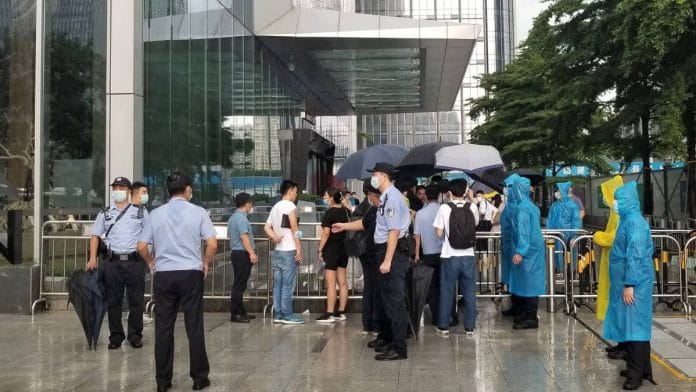New Delhi: Outside Evergrande’s headquarters in China’s Shenzhen Monday, protesters took to the streets demanding their money back. Soon after, the property giant announced that it is unable to sell its assets fast enough in order to repay a mounting debt of $305bn, adding that cash flow was under “tremendous pressure”.
“In view of the difficulties, challenges and uncertainties in improving its liquidity as mentioned above, there is no guarantee that the group will be able to meet its financial obligations under the relevant financing documents and other contracts,” Evergrande wrote in its filing.
This was followed by shares in the company plummeting, down by nearly 12 per cent Tuesday. In the past six months, shares in what is “quickly becoming the biggest financial worry in a country” have fallen dramatically by over 80 per cent.
Hui Ka Yan, the billionaire owner of the property giant, has repeatedly assured banks that the company “will pull through.”
According to Forbes, Hui — who started and built the company by essentially borrowing money — has a net worth of $8.03 billion.
How it all began
Founded in 1996 in Southern China’s Guangzhou, there are currently 1,300 projects in over 280 cities under Evergrande Real Estate which has now expanded to investing in electric vehicles, media units, soccer club, theme park, and a mineral water and food company.
Trouble started in 2020 when Evergrande sent a letter to Guangdong’s provincial government, noting how “payments due in January 2021 could cause a liquidity crisis and potentially lead to cross defaults in the broader financial sector.”
This letter — the authenticity of which has been refuted by Evergrande — became public knowledge by September, hurting the company’s stock and bonds. The giant has also blamed negative media reports for dampening the “confidence of potential property purchasers”.
While the company maintains that statements about its bankruptcy are “untrue”, several analysts have pointed towards concerns regarding what this could mean for the country’s economy. While others believe that a government-supervised restructuring could be on the cards.
“The government will step in since Evergrande is too big and the impact of disorderly liquidation will be too great to bear,” credit research firm Bondcritic’s managing partner, Warut Promboon, was quoted as saying by Forbes.
Also read: Zomato to Paytm, India’s record IPO boom is thanks to China






